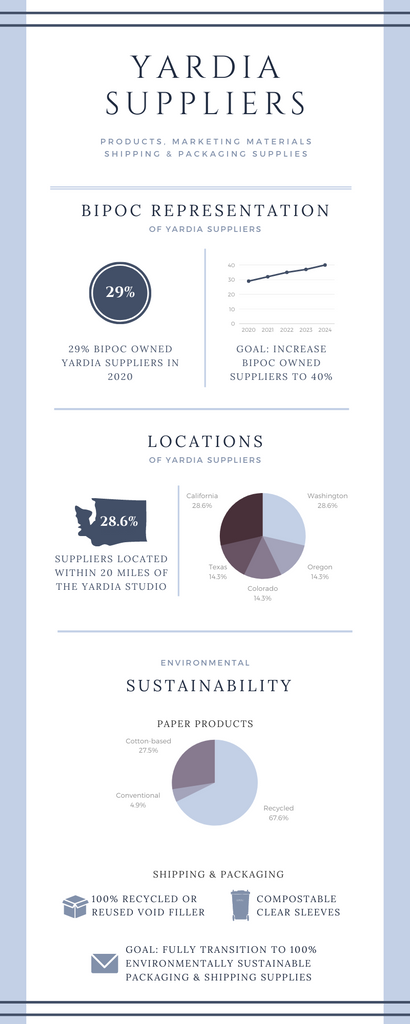
In an effort to more fully align Yardia's supply chain to my company and personal values, I've been working to change some of the suppliers who print or manufacture my products, marketing materials, packaging and shipping supplies. This is a work in progress, and I'm actively seeking and researching new suppliers in the intersected areas of: BIPOC-owned, Washington-based, and environmental sustainability. This is a starting point.
BIPOC Representation:
Currently, about 29% of Yardia's suppliers are owned by people of color (with about 14% Black-owned). Although this is higher than the percentage of BIPOC-owned businesses in the United States (only about 22%), my goal is to increase this number to 40% BIPOC-owned suppliers within the next four years.
In addition to its suppliers, Yardia is itself a BIPOC-owned company. As an indigenous CHamoru and multiracial woman of color, representation matters in a very personal way to me. Having a BIPOC woman as a mentor in my early adulthood and career (rest in peace, Alycia) made a huge impact on my personal and professional development, simply by being able to witness her in leadership roles and to receive her encouragement that I could do something similar with my own career. I hope I can provide this kind of legacy for the next generation of girls of color coming up, too.
Locations of Suppliers:
All suppliers that Yardia works with are based in the United States, with 28.6% in Washington, and 71% on the West Coast. Most materials they use in their printing processes are also US-sourced, except for camp mug blanks, which are imported.
My goal is to increase the number of Washington suppliers in order to reduce shipping distances in the supply chain and to support my local economy. This goal involves current active research, and will require patience to sell through current products before transitioning to new manufacturers.
Environmental Sustainability:
For products, camp mugs and stickers are made with conventional materials, so the primary focus is on paper products, packaging and shipping supplies. Cards and envelopes are 100% recycled, art prints are made with archival cotton-based paper, and wrapping paper is printed on conventional paper (it is recyclable, though, happily, which is a frequently-asked question.)
Most packaging supplies are recycled with occasional reused plastic pillows, bubble wrap or other packing materials from incoming shipments. Reusable shipping materials are always saved to stay within the shipping cycle to avoid the landfill. Backing boards on art prints are recycled, and plant-based protective clear sleeves used with cards and art prints are certified for commercial composting. Wrapping paper is packaged in conventional plastic tube bags.
My goal for the future is to transition to 100% environmentally sustainable packaging, and to reduce waste. Although the majority of materials are reused, recycled or compostable, materials like shipping tape and labels will transition to more eco-friendly solutions as available. To reduce waste, I encourage you to leave a note in the gift message area at checkout if you'd like your cards to ship without a compostable sleeve.
About the research process:
If you're a business owner or consumer looking to analyze the companies you work with or purchase from using a similar DEI and sustainability framework as I did, here are a few of the processes I found to be helpful. Note that this involves a good amount of very intentional online detective work, so it is worth allocating time to, and is an ongoing process.
I started by looking at the companies I already worked with in terms of their marketing messaging around these issues--on websites, about pages, blogs, social media accounts, and then compared these statements to actual data and leadership to get a more objective picture. I looked at who owned the companies, who served in leadership positions, and researched the individual leaders. I looked at what kinds of charity organizations the companies gave to and what political action groups and political campaigns the companies or owners financially supported.
When seeking BIPOC-owned suppliers, I used a combination of social media searching if the product is very specific, like vinyl stickers, and then followed the previous research to dig in deeper to each new company I found, collecting the information in a rubric-style chart to help me evaluate my options. For broader industries, like general printing as a whole, I also used state government databases to begin my research of companies in these sorts of manufacturing industries.
While this kind of research does take some time, it's something I relish and makes me feel like I'm getting a clearer understanding of the benefits and challenges of the companies I choose to invest in for manufacturing. I can be more certain that their priorities and values align with Yardia's by having the research and resources to back it up. Plus, it makes me feel like an armchair private investigator to do so.
This work is ongoing, so the data is current as of July 2020. As I continue to research and update my products (I already have two more changes I plan to make when I'm in need of new inventory, for example, but it will take some time before that happens), the numbers will adjust in the future.
Inafa'maolek. Make good. Strive for harmony.
